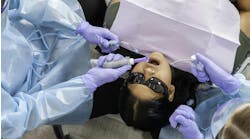Jason Watts, DMD
What if someone told you that your next decision would be about the most exciting, scary, rewarding, stressful, expensive, liberating, desirable, and challenging thing you’ll have done in your life to date? Would you do it?
One of the most common questions I am asked is “Should I buy a practice, build a practice, or buy into a practice?” If the magic eight ball were real, or if the mirror on the wall really did tell the truth, more people would own practices, and dentistry probably would not be in transition like it is today.
I wish there was a black and white answer, but this is truly determined by each individual’s vision. No matter how much you prepare or research, each start-up is unique in its own way. After starting three offices in less than one year, I quickly learned a lot about what people usually do not tell you. No single article or book can summarize all you need to know, but here are five critical considerations that I hope will help.
© Vichai Viriyathanaporn | Dreamstime.com
Start-up loan
Banks are usually willing to give a start-up loan to first-time practice owners. The amount is around $500,000. As long as you do not have excessive debt outside of student loans, getting approved is a relatively easy process. Get two or three quotes from different banks and weigh their offers. You should carefully consider the lowest interest rate and the amount of your progressive monthly payments (starts small and increases over time). All the banks will tell you they have certain benefits compared to the others, but remember, the person selling you the loan gets a commission check. After you sign the contract, you will not work with the person. Take the personal out and look purely at the numbers.
Liquid
Having a significant amount of liquid cash on hand is not required to get a loan, but it’s a really good idea. A decent starting point is approximately $20,000. But after opening three startups, I can tell you that $50,000 to $100,000 will give you more confidence and allow you to weather a slower start-up experience. “Rainy days” are very common with start-ups. You should also have emergency funds that will cover four to six months of your personal bills. Expect delays in construction, permitting, and grand opening.
Legal fees
There are two types of lawyers you might work with. Dental-specific lawyers can do just about everything, which is very convenient, but they expect a higher hourly fee. An alternative is to hire a lawyer who only focuses on one or two areas of law, which means you might need more than one. You will need a lawyer to negotiate your leasing space, create employee agreements (which are not necessary at first), create a legal entity for your business, and construction. Expect $5,000 to $10,000 in legal fees, depending on the lessor and depth of negotiations necessary. This usually comes out of the bank loan, but you might speak with a lawyer before you have access to your funding from the bank.
Contractor
Be very mindful of the contractor you pick, for the contractor will be the largest factor that determines when you’ll get to open your doors. General contractors can be your best and worst friends. There is no short article that can prepare you fully, but here are a few things to be mindful of:
• Get multiple bids. The cheapest is definitely not the best.
• Learn what the add-on fees are (cabinetry, finishes, architecture, permitting, etc.).
• Have a liquidation clause. This is a penalty if the contractor does not finish on time. The clause must have a specific date, usually 12 to 14 weeks from the day of permit approval.
• Is the contractor dental/medical specific? There are a lot of differences between building health-care spaces and homes.
• How many projects is the contractor juggling? Remember, after you sign the contract, your contractor is looking for the next customer, just like all other businesses do. If the contractor is building more than two to three projects at a time, your project could become delayed if it is smaller.
Start-up consultant
A lot of companies offer consulting and guidance during the start-up process. Their costs are usually high, but depending your needs, their services can be very beneficial. Every consultant is very different, so make sure to really look into what they will offer. Some only take you through the start-up process, and others continue to consult with you afterward. That is a big difference between a transactional relationship and a personal relationship.
At this point, I have either stimulated you or scared you. It’s likely that I have done both, but let this be your takeaway: Being a business owner is an incredible sensation no emotion can describe. Dentists spend their whole lives studying and learning, but nothing will prepare you for the journey of ownership. Live your life the way you want to live it. Be bold, take risk, and seek fulfillment. Don’t ever become complacent. Grow, experiment, and fail. We are blessed to have the opportunity in this incredible profession to do anything—do not limit yourself. You only live one life. When you look back at it all, how will you tell your story?
Live your best life, your way and on your schedule.
Jason Watts, DMD, is a general dentist and owner of Watts Dental in Lithia, Florida. He is an avid triathlete and iron man, consultant, creator of the Tri Smiles Foundation, and outdoor enthusiast. In his spare time, he speaks all over the country to dental students and dentists about trends in the economy, motivational speaking, negotiations, and building success. The most important thing is Dr. Watts hates bios! If you want to get to know him, talk to him at [email protected].







